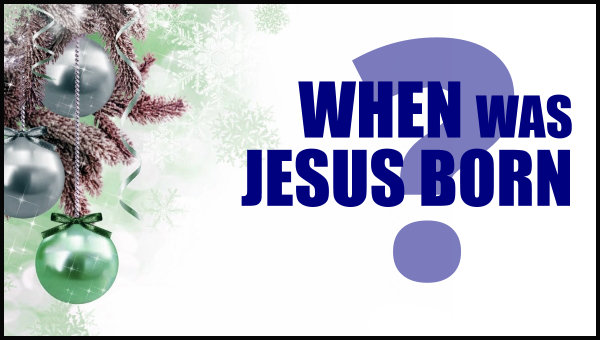By Tyson Thorne

Today is Christmas, the day we celebrate the birth of our savior Jesus, but how is it that December 25th came to be celebrated for this historic occasion? Many modern scholars believe that the Roman Catholic Church chose this date in an effort to “Christianize” pagan winter festivals, but this is likely not the case. There may in fact be real evidence for December 25th being the actual date of Jesus’ birth. I’d like to say this evidence is new, but it is really quite ancient, which makes it an even more compelling argument. Interested? Read on!
According to “How December 25th Became Christmas” (Bible History Daily, December 2, 2016), the Catholic Church didn’t starting converting pagan holidays until the fifth century AD (after Constantine put his faith in Christ and took Constantinople), yet Christmas had been celebrated by the Western church on December 25th for nearly 200 years before this practice. Furthermore, early Christianity was attempting to disassociate itself from pagan religions (like the “mystery religions” of the first and second centuries) and differentiate itself from Judaism. It is highly unlikely, therefore, that the conventional explanation for December 25th being celebrated as Jesus’ birthday holds water.
How, then, was the date chosen? The article referenced above states:
There is another way to account for the origins of Christmas on December 25: Strange as it may seem, the key to dating Jesus’ birth may lie in the dating of Jesus’ death at Passover… Around 200 C.E. Tertullian of Carthage reported the calculation that the 14th of Nisan (the day of the crucifixion according to the Gospel of John) in the year Jesus died was equivalent to March 25 in the Roman (solar) calendar. March 25 is, of course, nine months before December 25; it was later recognized as the Feast of the Annunciation—the commemoration of Jesus’ conception. Thus, Jesus was believed to have been conceived and crucified on the same day of the year. Exactly nine months later, Jesus was born, on December 25.
The strengths of this argument is two-fold. First, there are a couple ancient texts referenced in the article that make this association, as well as medieval artwork that communicates the same idea. This shows that the church from about the third century on had accepted this line of reasoning. The second is that it aligns with even more ancient Jewish beliefs. In the Talmud, many historic events are recorded as happening on the same dates. For example, Rabbi Eliazer reports, ““In Nisan the world was created; in Nisan the Patriarchs were born; on Passover Isaac was born … and in Nisan they [our ancestors] will be redeemed in time to come.” There are more dates that align on the Jewish calendar showing that God clearly does use dates from one event to coincide with other important events. It is reasonable, then, that Jesus would die on the same day of his immaculate conception. This would lead one to the date of December 25th.
As interesting as this is, Think-Biblically believes Jesus’ birth occurred nowhere near December 25th. By reading the Bible carefully there are several clues about when Jesus was born. We know, for instance, that Elizabeth was a few months pregnant with John when Mary was visited by the angel Gabriel who informed her of God’s plan. We know that Gabriel informed John’s father, Zachariah, when he was tasked to enter the holy of holies in preparation for a particular festival. Likewise, we know that a festival was taking place at the time of Jesus’ birth, this causing an overflow of people around Jerusalem creating the circumstance of no rooms being available for a very pregnant Mary and her husband. There was an eclipse that took place near the time of Herod’s death that also helps us to pinpoint the event. These are the broad strokes that have lead us to our conclusion.
We believe the festival being celebrated at the time of Jesus’ birth was Rosh Hashanah, taking place on September 11th in the year 3 BC. Not only does this line up with the evidence based on Biblical and astrological events, it too has the added advantage of falling on another important event on the Jewish Calendar: The day of the world’s creation. It is entirely appropriate for the Creator and Second Adam to have been born on this day.
What difference does this make? That is up to you. It is unlikely that Christmas will be moved on our calendars, but if you like you may mark this as a special date on your calendar and celebrate it according to tradition. It is a holy day, like the Sabbath, so no work is to be done. A tradition of eating apples dipped in honey is still observed by Jews to this day. Also, one usually spends the day examining the last year, repenting of one’s sins and mistakes, and actively planning how to avoid those pitfalls in the coming year.
|
|
